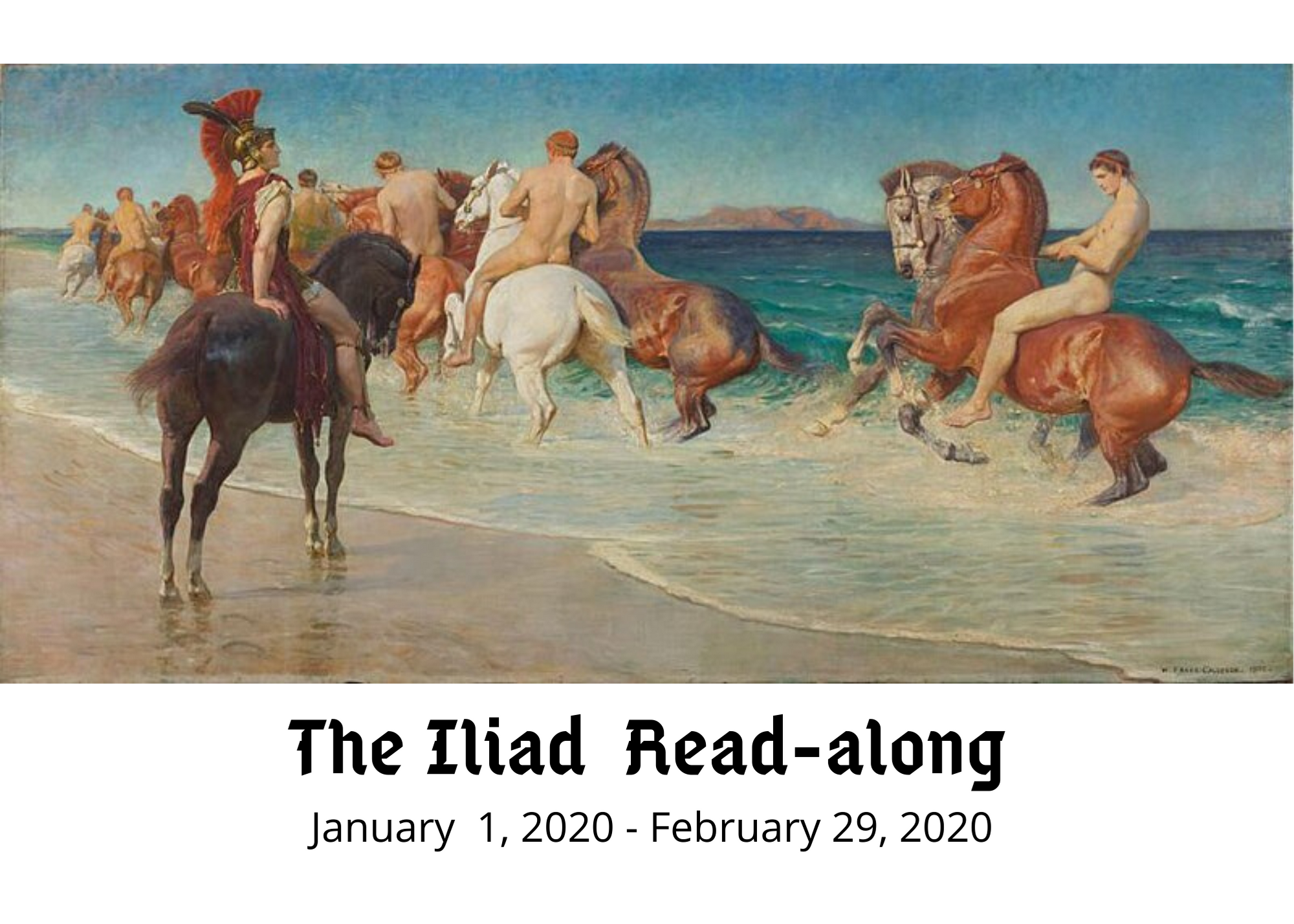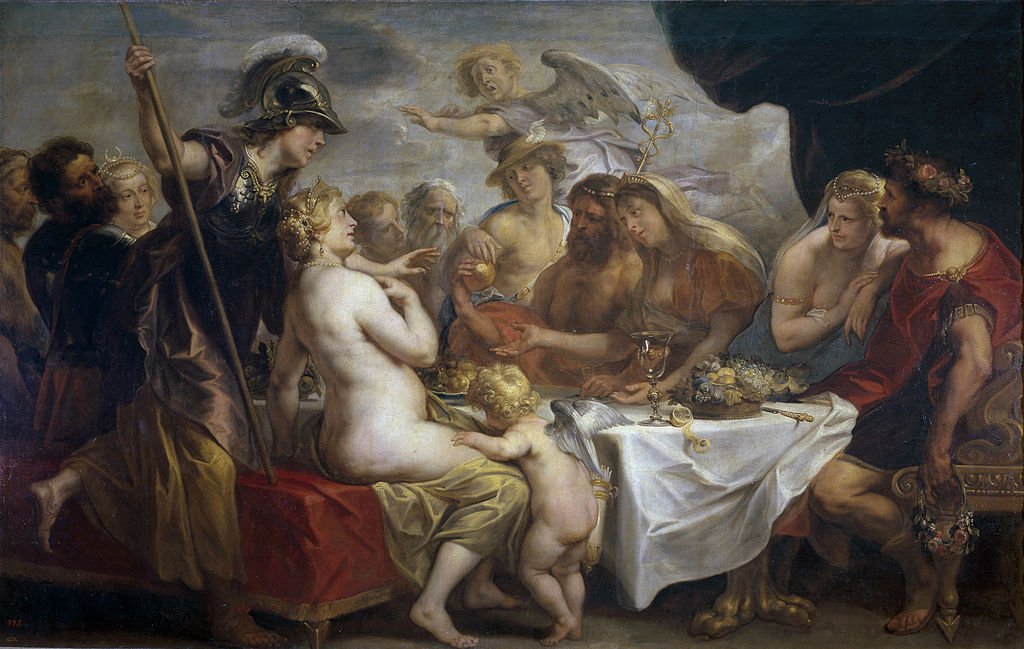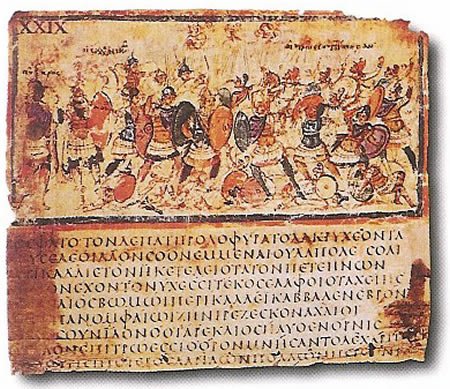
Well, I’ve been encouraged very nicely by some Goodread’s friends to host a the Iliad read-along in 2020. Because of my love of Greek literature and always wanting to share that love, I’ve agreed to do it. It’s probably crazy, piggybacking it on my The House of Mirth read-along, never mind The Art of Loving and The Four Loves read-alongs before that, but those who know me will agree that it’s not surprising. Ha, ha!
So here we go ….!!!!
Backstory:
The Judgement of Paris
Eris, the goddess of discord, is not invited to the marriage of Peleus and Thera, and in retaliation for the snub, she arrives bearing a Golden Apple. Claiming it is a prize of beauty, Hera, Aphrodite and Athena move to claim it. Zeus is appointed judge of the contest, but unwilling to favour one goddess over another, he gives the honour to Paris, a Trojan prince. Meeting on Mount Ida, each of the goddesses tries to bribe Paris to choose her: Hera offering the kingdoms of Europe and Asia, Athena offering wisdom and great skill in war, and Aphrodite offering Paris the most beautiful woman in the world. Paris choses Aphrodite, this fateful choice later linking to the kidnapping by Paris of Helen of Sparta, wife of Menelaus, and the beginning of the Trojan war. It also explains the enmity of Hera towards the Trojans in the Iliad.
Helen and her Suitors – the Oath of Tyndareus
When Helen was going to be wed, a number of suitors turned up to win her hand. Through an agreement between Odysseus and Helen’s father, Tyndareus, the suitors finally pledged an oath to defend the winner of Helen’s hand in marriage, who turned out to be Menelaus. This circumstance was the reason that so many Greek heroes participated in the war against Troy to have Helen returned.
The Sacrifice of Iphigenia & Agamemnon
After the kidnapping of Helen by Paris, prince of Troy, Menelaus appeals to his brother, Agamemnon, king of Mycenae, and other Greek heroes who had previously agreed to protect Helen. They plan to sail for Troy, however Agamemnon offends the goddess, Artemis, and she causes them to continually have unfavourable winds. To atone for the insult, Agamemnon must sacrifice his only daughter, the innocent Iphigenia. This act culminates in a tragedy after the end of the war which is referenced in the play by Aeschylus, Agamemnon.
Now on to the Iliad itself …..
The Iliad, or in Greek, Ἰλιάς, is one of the first full-scale epic poems in Western literature and served as a model for later epics. It comes out of an oral tradition of storytelling and is attributed to the blind poet, Homer. The events in the Iliad take place in the 12th century B.C., near the end of the Trojan War.
The Iliad is not a story as we understand it in a modern context. Although the war against Troy lasts for ten years, the poem covers only on a short period of time during the last year of the war, and its focus is on warrior ethos, in particular the two important themes in Greek life, fame or glory (kleos) and honor (timê). These themes are crucial to the understanding of most Greek literature, as kleos is what is spoken about the person or what other people say about them, and their extent of kleos often depends on timê, which is the war prizes each warrior accumulates and represent a tangible, physical expression of their honour. Finally, kleos represents the only true form of Greek immortality and is how a man’s reputation lives on, once he is dead. Their influence on ancient Greek worldview and people’s actions cannot be stressed enough.
It’s important to pay attention to the first words of this poem, “Sing, goddess, the anger of Peleus’ son Achilleus and its devastation which put pains thousandfold upon the Achaians.” So while the poem does give us an episodic view into The Trojan War, its basis is the anger of Achilles and its effect on those around him, a human and psychological focus instead of a narrating of practical events. Make note of the cause of Achilles’ anger and the consequences of his quarrel with Agamemnon. In fact, the type of Achilles’ wrath in Greek (μῆνις Ἀχιλλέως, mênis Achilléōs) is usually only used to reference the gods.
Here are some questions to ask yourself as we travel through the poem:
- Does our freedom have limits? If so, what are they?
- Who or what forms our deeds and our goals or ends?
- Is there a collective humanity that we share, or is our life circumstance only “a constant seeking of power after power”?
- What unites people and makes them persevere in dire circumstances such as war?
- Why do we love our personal attachments to people, country, etc. so intensely?
- Where is the boundary between justice and revenge?
- What does it mean to be alive?
I hope I’ve included everything pertinent to beginning the read and that it helps us navigate this wonderful Greek epic! Bon voyage!
…………………………………….. The Iliad – A Schedule and a Note on Translations ⇒







:O This sounds fantastic! If I didn’t have other reading commitments for January I would join…regardless, can’t wait to read the posts and discussion of the group. <3
That’s too bad that you don’t have the time. 😢 I was a little hesitant to do it at first, but now I’m looking forward to it. I’ll probably be doing The Odyssey after it, however THEN I have to focus on classics that I haven’t read yet.
seriously, do you know Greek? which translation are you going to use? can i use Chapman’s?
I was taking first year Greek when I fell off my bike and onto my head, so I had to quit, sadly, but I do know a little bit of it and I’d love to take it up again. I HIGHLY recommend the Lattimore translation. I’ll post a schedule and some input into translations in a day or so. I’m so glad you’ll be joining us. Yay, Mudpuddle!!
I don’t know that I will re-read this or not yet…..but I do want to follow your discussions for the read-along whether I re-read it or not with the hope that I will be able to understand this classic work better than I did when I actually read it. 🙂 Will you schedule out the readings per week like you did with The House of Mirth?
Oh, come on! Re-read it, especially if you had a “meh” experience to begin with. I’d love to have your input! I’ll put up a schedule and some information on translations in a few days. It’s going to be approximately 2 chapters every five days.
You may be able to twist my arm into re-reading it. 😉 I’ll pull my copy out tonight and see how much 2 Ch. every 5 days will be. And then I’ll think about it. 🙂
Twist, twist! Very gently though! 😉 Let me know and Merry Christmas to you and yours! 🎄
Merry Christmas!
I just read this at the beginning of the year, so it’s too soon for me to be willing to reread, but I look forward to following along the discussion! I actually wish I would have had some of this background before I started reading in January; understanding the concepts/importance of kleos and timê would certainly have helped in my reading.
Ah, that’s too bad it’s not coordinating for you. When I first read The Iliad, I had a group really help me with all the ins-and-outs of it. It was invaluable. In any case, if you follow along, the conversation might add some more insights!
I read the Iliad but I just did not enjoy it. I’m sure that’s on me, though. I’m glad you enjoyed it so much.
Read it again with us! You might have a completely different experience!
That sounds great! I cannot think of any way I can fit it in — and I’ve read the Iliad a couple of times — but I’ll be very happy to follow along with the discussions.
My reading year of 2020 is filling up quickly as well! In any case, any input you have would be very welcome!
I’m afraid I won’t be able to fit in reading along this time either, but I’m looking forward to the discussions.
Enjoy!
Oh rats! Well thanks for participating in the last one! You’ve read The Iliad before, haven’t you?
I have, but I’d cheerfully read it again. But I’m gone for a couple of weeks in the middle, and have a stack of library books I need to read soon.
I will probably reread it in the Emily Wilson when it comes out later this year I think.
Pingback: First Reading Projects of 2020 |
How exciting! I need to decide what I’m reading in January… I don’t know if I will join in, but I will certainly be following along with your posts.
I’m looking forward to what you choose to read for January. No worries, but I would have loved to have had your insightful thoughts on this one!